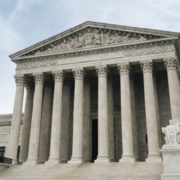The Incredible Shrinking Case for Common Core
Recent statements by Common Core co-author David Coleman about Catholic education have led to a lot of confusion. What’s this about a Common Core advocate urging Catholic educators to have the “moxie” to preserve their incredible heritage and not to worry about changes to standardized tests?
I’ll try to explain. Despite Coleman’s support for the Common Core — which I firmly believe to be inadequate and even harmful to Catholic schools — what he said is good for Catholic families.
Last month, my colleagues and I were dismayed to learn that Coleman, a chief author of the Common Core State Standards, will keynote the National Catholic Educational Association (NCEA) convention in March. The Cardinal Newman Society has raised serious concerns about the Common Core’s impact on Catholic identity and related changes that detract from Catholic schools’ time-proven curricula and methods. The choice of Coleman as keynote speaker suggests support for the Common Core, when what we most need is a frank conversation among Catholic educators and parents about the Common Core and its unsuitability to Catholic education.
In addition, Coleman is president of The College Board, the nonprofit testing company that sponsors the Scholastic Aptitude Test (SAT) and Advanced Placement (AP) tests — and is currently revising them to align to the Common Core. That has caused angst among Catholic families and educators, who wonder if students in non-Common Core schools and homeschools will do poorly on the SAT and have difficulty getting accepted to good colleges.
But when we looked closely at Coleman’s record, we saw some interesting things. For instance, he has a fondness for good literature — precisely what we fear the Common Core might diminish in Catholic school reading curricula — and he studied “classical educational philosophy” at Cambridge University, according to his online biography.
Moreover, last year he penned an outstanding piece for National Review Online, defending the religious freedom of Wheaton College, an evangelical Christian college, and extolling the benefits of a religious liberal arts education. The non-Christian scholar noted that he had been to Wheaton to participate in a conference on the great Christian apologist, C.S. Lewis, and his methods of literary criticism.
This was intriguing. What if the co-author of the Common Core, which was designed for low-performing public schools, would go on record praising the benefits of a truly Catholic, liberal arts education — and even the movement toward more classical education? Could an advocate for the Common Core in public schools appreciate the differences and even the superiority of a Catholic education that rejects the Common Core’s utilitarian emphasis and holds steadfast to its Catholic identity and traditional curricula and teaching methods?
And furthermore, what if the College Board president could assure Catholics that students will continue to do well on the revised SAT and AP exams, even if they have a traditional Catholic education, focused on the liberal arts and not in any way compromised or caught up in the race to become more like public schools? This would, in effect, dispel one of the key arguments for adopting the Common Core simply so that students can “keep up” with the changes to standardized tests.
In essence, Coleman said exactly what we anticipated in his interview released Monday. On the one hand, he still clearly supports the Common Core, which we believe would compromise the traditional methods, curricula and mission of Catholic schools. He argued that the Standards had been misinterpreted and do not necessarily conflict with Catholic education: “The vulgar implementation of anything can have a reductive and destructive effect,” he said. With regard to the Standards’ push for more reading of “informational texts,” Coleman didn’t think that the emphasis necessarily means that schools will assign fewer classics of literature — a point on which we continue to disagree.
But what Coleman did say is this, quite emphatically: don’t compromise what Catholic schools do well. On that bedrock principle, we seem to agree entirely. If anything — whether the Common Core or another “reform,” changing social mores, threats against religious freedom or another influence — pressures Catholic schools to compromise their mission and abandon the core liberal arts focus of traditional Catholic education, then we should simply refuse to do so.
“My desire to celebrate, and name and specify some of the beauties and distinctive values of a religious education are precisely to avoid a leveling quality where you forget that there are special gifts that can be lost without attention,” Coleman said.
He urged educators in the classical and Catholic liberal arts tradition to “have more moxie” and “be proud” of their approach to education.
“Don’t be in a defensive crouch. I say that to every group I talk to of religious educators,” he said. “I say, share what you do that is beautiful and distinctive. Don’t just defend your right to exist. Be proud of what you have to offer, which is different.”
Regarding the College Board’s exams, Coleman doesn’t think that students getting a traditional, Catholic liberal arts education — or even a classical-style education focused on the Trivium of grammar, logic and rhetoric — need to be worried about getting lower scores on the SAT and AP tests. He said that Catholic families should “rest assured” that students will continue to do very well on the tests.
“As president of The College Board, it is my conviction that a child excellently trained in traditional liberal arts will do superbly on relevant sections of the SAT and other aspects of Advanced Placement work,” he told us. We’ll know in time whether that’s true, but I guessed it to be true even before Coleman said it. A student who has a good, non-Common Core education should be able to think through these tests. Some extra preparation may be helpful to get used to the Common Core-style questions, but hasn’t SAT prep always been a boost to students’ scores?
Ultimately, Coleman’s interview suggests just one more reason why Catholic educators should not be so eager to rush into the Common Core madness. Many parents, teacher unions and state leaders have turned against the Common Core after just a few years in the public schools. There’s been no boost to national test scores. Catholic educators who may be inclined toward the Common Core should acknowledge the warning signs and take their time, observe how the Common Core plays out, and then decide whether there are certain elements in the Standards that may be worth preserving — and in the meantime, protect what we already have.
Catholic education is good. In earlier times, it was better. The renewal of Catholic education doesn’t need the Common Core — we just need some “more moxie” to defend and celebrate what makes our schools strong.
This article was originally published by National Catholic Register and is reprinted with permission.




 Photo by David Mark via Pixabay CC0
Photo by David Mark via Pixabay CC0

